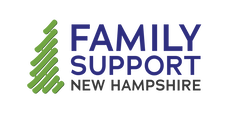|
“Are you wondering whether your local Family Resource Center is really for everyone in our community?” The question, posed by the President of Family Support New Hampshire, made me smile as I thought about the Greater Tilton Area Family Resource Center and its effort to ensure community members seeking recovery or working to sustain recovery have access to high-quality support. As a spouse to someone who developed OUD (Opioid Use Disorder) after a roofing accident, I have experienced many of the heartbreaks and triumphs that come with a loved one affected by the use of opioids. I smile, now, because of how far we have come in the past five years as a State thanks in large part to the efforts of advocates like Lindy Keller at BDAS*, the leaders in the recovery community, and those in recovery becoming strong public voices to share hope, strength, and power to open up recovery pathways beyond abstinence. And as a community member of Tilton who has worked in an underfunded, antiquated building alongside a handful of women —5 to be exact— I can attest to what can be accomplished with a few thousand dollars and a little willingness to get a job done. Community canvassing, focus groups, help from NH Listens, and one vibrant ministry in the form of a food pantry was our beginning point. From there, unfailing dedication led to the founding of the Greater Tilton Area Family Resource Center and our ability to address two prominent issues affecting our community: poverty and substance use, one of the most misunderstood, stigmatized conditions we live with in society today. Terrible things are said about substance use online, in newspapers, in the media. People have been hurt, not only by public misconceptions, but by family and friends, as well as by members of the recovery community who do not understand Substance Use Disorder (SUD) and place blame or harbor false perceptions around individual choice. We forget that when someone “gets sober,” that doesn’t mean their brain, a living organ, has “recovered” overnight. For me, it took a long time and a lot of education to understand the difference between sobriety and recovery, and to internalize that recovery can be a long process. But, thankfully, there is hope. There are 24,000,000 people in recovery in the United States alone. In New Hampshire, we are fortunate to have 13 Recovery Organizations and 18 Recovery Centers supported by the State. Some Family Resource Centers are connected directly, like TLC in Claremont and its Center for Recovery Resources or Whole Village in Plymouth and the Plymouth Area Recovery Connection Center. Along with Franklin Family Resource Centers, we offer the Sober Threads Peer Recovery Support programs, and the Gorham Family Resource Center has integrated recovery supports in all they do. Our center is proud to be accredited with the National Council on Accreditation of Peer Recovery Support Services, as we provide recovery coaching and telephone recovery support similar to other State supported Recovery Community Organizations. And like many FRCs, we provide parent education programs specifically designed for parents in recovery and support groups for Kinship Families. Additionally, we will soon begin Recovering Together cafes to jumpstart healthy family conversations to provide a venue for healing relationships. Education and compassion, healthy boundaries, learning to cope with life on life’s terms—these things are not easy. But by reaching out to your local Family Resource Center, we can make connections for you or loved ones in need of recovery support services, and we can link families to other supports such as our Kinship programming. Family Resource Centers ARE for everyone. Absolutely. Unequivocally. We are here to help. We KNOW families have lived too long under the weight of stigma. You are not alone. In the era of COVID isolation, families in recovery need connection more than ever. Reach out to your local Family Resource Center to make the connections with you. Because we all know that individuals and families can recover together with the right support. So how can we help with your and/or your family’s recovery today? Michelle Lennon
Executive Director for the Greater Tilton and Franklin Family Resource Centers *BDAS Recovery Resource Guide was updated last month. To view it, click HERE:
0 Comments
Leave a Reply. |
AuthorMelony Williams Archives
March 2021
Categories |
FRC LOCATOR
|
Family Support New Hampshire acts to bring together the diverse leadership from existing and newly forming family resource centers and family support programs within New Hampshire under the common vision of establishing a statewide network of family support practice within New Hampshire.
|
NHCT strives to ensure parents have access to high-quality resources and support to help children develop through education of direct-service professionals, advocacy for better policies to support parents, and connection with local agencies to strengthen families and lay the foundation for children's success.
|
|
©Copyright 2024 Family Support NH
|
powered by harbour light
|
The preparation of this website was financed under a Contract with the State of New Hampshire, Department of Health and Human Services, with funds provided in part
by the State of New Hampshire and/or such other funding sources as were available or required, e.g., the United States Department of Health and Human Services.
by the State of New Hampshire and/or such other funding sources as were available or required, e.g., the United States Department of Health and Human Services.

 RSS Feed
RSS Feed

